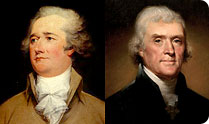Hamilton’s America —
Jefferson’s America
Wednesday, Mar. 24, 2010
7:00 p.m.–8:30 p.m. (EST)

Leader
Thomas Jefferson Memorial Foundation
Professor of History, University of Virginia
About the Seminar
Alexander Hamilton and Thomas Jefferson offered distinct visions for the nation they were founding — one urban and industrial, the other rural and agrarian. In twenty-first-century America, a nation of cities and commerce, it is easy to think Hamilton won. But did he? How did the two visions clash in eighteenth-century America? What were their origins, and what have they meant for the United States?
This seminar is a collaboration between the National Humanities Center and public television’s historical documentary film series AMERICAN EXPERIENCE. Participants will view the AMERICAN EXPERIENCE film Alexander Hamilton and explore how to use it in the classroom.
As you view the film and read the texts, please keep the following questions in mind. They will guide discussion in the seminar.
- Constitutional Interpretation: Jefferson feared that an expansion of federal powers through Hamilton’s “loose construction” of the federal Constitution would jeopardize the survival of the union. What is the logic of his apparently counter-intuitive “strict constructionist” position? How do these opposing approaches to the Constitution reflect different experiences of the American Revolution and different visions of the new nation’s future?
- Foreign Policy: Jefferson and James Madison sought to promote American interests abroad by an aggressive foreign commercial policy; Hamilton was more concerned with protecting federal revenue derived from import duties on the lucrative Anglo-American trade and therefore sought to avoid conflict with the old mother country. How can we reconcile these positions with the conventional understanding that Jeffersonian Republicans favored minimal government while Hamilton and his fellow Federalists were precocious advocates of big government?
- Independence and Economic Development: If Hamilton and Jefferson had conflicting visions of the nation’s future, they also differed on the meaning of American independence. What role did Hamilton and Jefferson envision for the United States in the European state system? How do their contrasting positions on manufactures illuminate their respective worldviews?
Enter Moodle Forum
Assigned Readings
To incorporate seminar texts into your teaching, we offer the National Humanities Center's Primary Document Application Form.
- Alexander Hamilton film on AMERICAN EXPERIENCE, PBS online. Please pay special attention to the following segments:
- Chapter 9: “Secretary of the Treasury” (9:22)
- Chapter 11: “Hamilton v. Jefferson” (14:31)
- Thomas Jefferson, “Manufactures,” Query XIX in Notes on the State of Virginia, 1787 and Alexander Hamilton, Report to Congress on the Subject of Manufactures, 1791, excerpts in Living the Revolution: America, 1789–1820
- Hamilton’s Opinion as to the Constitutionality of the Bank of the United States, Feb. 3, 1791, in Joanne B. Freeman, ed., Alexander Hamilton Writings (New York: Library of America, 2001), 613-46 (excerpts)
- Jefferson’s Opinion on the Constitutionality of a National Bank, Feb. 16, 1791, in Merrill D. Peterson, ed., Thomas Jefferson Writings (New York: Library of America, 1984), 416-21
- Hamilton to George Washington, Aug. 18, 1792, in Freeman, ed., Alexander Hamilton Writings, 760-88 (excerpts)
- Jefferson to Washington, Sept. 9, 1792, in Peterson, ed., Thomas Jefferson Writings, 992-1001
- Jefferson’s Report on Commerce, Dec. 16, 1793, in Peterson, ed., Thomas Jefferson Writings, 435-48 (excerpts)
- Jefferson to Benjamin Austin, Jan. 9, 1816, in Peterson, ed., Thomas Jefferson Writings, 1369-72
Presentation
PowerPoint: 716 KBOnline Evaluation
Seminar Recording
Download Recording (You will need to install the WebEx ARF player, available at download, to playback the recording.)
